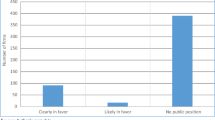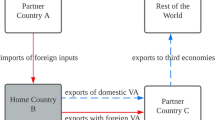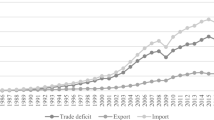Abstract
This paper investigates how the rise of global value chains (GVCs) in international trade affects the political economy of trade disputes. It addresses the gap between the domestic and international politics of trade disputes, which is especially relevant in these times as populist nationalism favors protectionist forces. We advance the argument that firms face institutional disadvantages in opposing protectionist forces at home, as observed in how contesting firms fare in US anti-dumping cases. As a consequence, they have incentive to seek cross-border cooperation with firms along the supply chain to escalate the adoption of anti-dumping measures to WTO disputes. The paper implements a two-stage empirical strategy. First, we examine the political contestation around US anti-dumping cases ongoing in the WTO era that takes place in International Trade Commission (ITC) hearings. We observe that while these cases see significant opposition from firms relying on the imports of intermediate goods, most cases end in favor of petitioners supporting the imposition of anti-dumping duties. In a second step, we quantitatively analyze the effect of intermediate and GVC goods trade in products that are the subjects of anti-dumping cases on the incidence of a formal WTO dispute. The results suggest that the high costs of litigation at the WTO are often prohibitive relative to the volume of trade in question and pose an equally difficult challenge for firms seeking to overturn protectionist measures.

Similar content being viewed by others
Notes
Washington Post, 19 January 2018.
A notable exception is Davis and Shirato (2007)
The number of cases is determined from the Temporary Trade Barriers Dataset (Bown 2014)
For an informal guide to the process prepared by staff from the International Trade Commission’s Office of Investigations,see the Antidumping and Countervailing Duty Handbook, 14th Ed. (2015).
In cases where this second condition is not fulfilled, the Department of Commerce will conduct a poll to determine the level of support for the petition.
Petitioners are required to file both with the Department of Commerce and the ITC on the same day. The Department of Commerce decides for or against an investigation in response to the petition.
The ITC communicates the findings of its preliminary investigation to the Department of Commerce within 45 days, and the Department of Commerce completes this stage within 115 days after that of the ITC.
The Department of Commerce makes its final determination within 235 days of the filing of the petition. Within 45 days after the final determination of the Department of Commerce, the ITC also makes its final determination.
Requests for inclusion must be filed with the ITC Secretary within 7 days of the ITC’s announcement in the Federal Register of its intention to investigate.
This new case is at this point ‘complete’ and the records available as the ITC has only recently made its first determination that imports have caused ‘material injury.’
Investigation Nos: 701-TA-560-561 and 731-TA-1317-1328, available on the ITC website.
Investigation No: 731-TA-991. Transcript can be found on the ITC website.
A flowchart of the US anti-dumping process can be found here: . Accessed October 31, 2018.
The overall number of WTO disputes in which the US acted as respondent in the WTO period until 2015 was 49.
https://relatedparty.ftd.census.gov/. Accessed 26 June 2017.
https://comtrade.un.org/
The same results hold for the interaction effect between Intermediate Good and (log) Imports of Product. It shows that Intermediate Good is insignificant over the entire range of (log) Imports of Product. The results are available on request.
All other continuous variables are kept at their mean value while Obama is set to zero, Bush is set to one and the industry fixed effects are all set to zero such that the predicted probabilities illustrate a metal product.
References
Aw, B. Y., Chung, S., and Roberts, M. J. (1998). Productivity and the decision to export: Micro evidence from Taiwan and South Korea. Technical report, National Bureau of Economic Research.
Baccini, L., Du¨r, A., & Elsig, M. (2018). Intra-industry trade, global value chains, and preferential tariff liberalization. International Studies Quarterly, 62, 329–340.
Bernard, A. B., & Jensen, J. B. (1999). Exceptional exporter performance: Cause, effect, or both? Journal of International Economics, 47(1), 1–25.
Bernard, A. B., Eaton, J., Jensen, J. B., & Kortum, S. (2003). Plants and productivity in international trade. American Economic Review, 93(4), 1268–1290.
Bown, C. P. (2010). China’s wto entry: Antidumping, safeguards, and dispute settlement. In China’s growing role in world trade (pp. 281–337). University of Chicago Press.
Bown, C. P. (2014). Global antidumping database. The world bank, june.
Brutger, R. (2014). Screening for success: The effect of firm signaling on wto case selection. In Washington, DC: Annual Meeting of the American Political Science Association.
Busch, M. L., & Reinhardt, E. (2000). Bargaining in the shadow of the law: Early settlement in gatt/wto disputes. Fordham International LJ, 24, 158.
Busch, M. L., & Reinhardt, E. (2003). Developing countries and general agreement on tariffs and trade/world trade organization dispute settlement. J. World Trade, 37, 719.
Curran, L., & Eckhardt, J. (2017). Smoke screen? The globalization of production, transnational lobbying and the international political economy of plain tobacco pack- aging. Review of International Political Economy, 24(1), 87–118.
Davis, C. L., & Bermeo, S. B. (2009). Who files? Developing country participation in gatt/wto adjudication. The Journal of Politics, 71(3), 1033–1049.
Davis, C. L., & Shirato, Y. (2007). Firms, governments, and wto adjudication: Japan’s selection of wto disputes. World Politics, 59(2), 274–313.
Eaton, J., & Kortum, S. (2002). Technology, geography, and trade. Econometrica, 70(5), 1741–1779.
Eaton, J., Kortum, S., & Kramarz, F. (2004). Dissecting trade: Firms, industries, and export destinations. American Economic Review, 94(2), 150–154.
Eckhardt, J., & Poletti, A. (2016). The politics of global value chains: Import-dependent firms and EU–Asia trade agreements. Journal of European Public Policy, 23(10), 1543–1562.
Elsig, M., & Stucki, P. (2012). Low-income developing countries and wto litigation: Why wake up the sleeping dog? Review of International Political Economy, 19(2), 292–316.
Francois, J., Horn, H., and Kaunitz, N. (2007). Trading profiles and developing country participation in the wto dispute settlement system.
Guzman, A. T., & Simmons, B. A. (2005). Power plays and capacity constraints: The selection of defendants in world trade organization disputes. The Journal of Legal Studies, 34(2), 557–598.
Jensen, J. B., Quinn, D. P., & Weymouth, S. (2015). The influence of firm global supply chains and foreign currency undervaluations on us trade disputes. International Organization, 69(4), 913–947.
Johns, L., & Pelc, K. J. (2014). Who gets to be in the room? Manipulating participation in wto disputes. International Organization, 68(3), 663–699.
Johns, L., & Wellhausen, R. L. (2016). Under one roof: Supply chains and the protec- tion of foreign investment. American Political Science Review, 110(1), 31–51.
Kim, I. S. (2017). Political cleavages within industry: Firm-level lobbying for trade liberalization. American Political Science Review, 111(1):1–20, 1.
Kim, I. S., Milner, H. V., Bernauer, T., Osgood, I., Spilker, G., and Tingley, D. (2019). Firms and global value chains: Identifying firms’ multidimensional trade. Interna- tional Studies Quarterly, pages 1–15.
Lawton, T. C., & McGuire, S. M. (2001). Supranational governance and corporate strategy: The emerging role of the world trade organization. International Business Review, 10(2), 217–233.
Manger, M. S. (2009). Investing in protection: The politics of preferential trade agreements between north and south. Cambridge: Cambridge University Press.
Melitz, M. J. (2003). The impact of trade on intra-industry reallocations and aggregate industry productivity. Econometrica, 71(6), 1695–1725.
Osgood, I. (2018). Globalizing the supply chain: Firm and industrial support for us trade agreements. International Organization, 72(2), 455–484.
Palmeter, D. N. (2000). The wto as a legal system. Fordham International Law Jornal, 24(1 & 2), 440–480.
Poletti, A., & De Bièvre, D. (2014). Political mobilization, veto players, and wto litigation: explaining european union responses in trade disputes. Journal of European Public Policy, 21(8), 1181–1198.
Rosendorff, B. P. (2005). Stability and rigidity: Politics and design of the wto’s dispute settlement procedure. American Political Science Review, 99(3), 389–400.
Sattler, T., & Bernauer, T. (2011). Gravitation or discrimination? Determinants of litigation in the world trade organisation. European Journal of Political Research, 50(2), 143–167.
Sattler, T., Spilker, G., & Bernauer, T. (2014). Does wto dispute settlement enforce or inform? British Journal of Political Science, 44(4), 877–902.
Steger, D. P., & Hainsworth, S. M. (1998). World trade organization dispute settlement: The first three years. Journal International Econ. L., 1, 199–226.
Yildirim, A. B. (2018). Firms integration into value chains and compliance with adverse wto panel rulings. World Trade Review, 17(1), 131.
Yildirim, A. B., Chatagnier, J. T., Poletti, A., & De Bièvre, D. (2018). The interna- tionalization of production and the politics of compliance in wto disputes. The Review of International Organizations, 13(1), 49–75.
Zangl, B. (2008). Judicialization matters! A comparison of dispute settlement under gatt and the wto. International Studies Quarterly, 52(4), 825–854.
Author information
Authors and Affiliations
Corresponding author
Additional information
Publisher’s note
Springer Nature remains neutral with regard to jurisdictional claims in published maps and institutional affiliations.
Rights and permissions
About this article
Cite this article
Kim, S.Y., Spilker, G. Global value chains and the political economy of WTO disputes. Rev Int Organ 14, 239–260 (2019). https://doi.org/10.1007/s11558-019-09350-4
Published:
Issue Date:
DOI: https://doi.org/10.1007/s11558-019-09350-4




